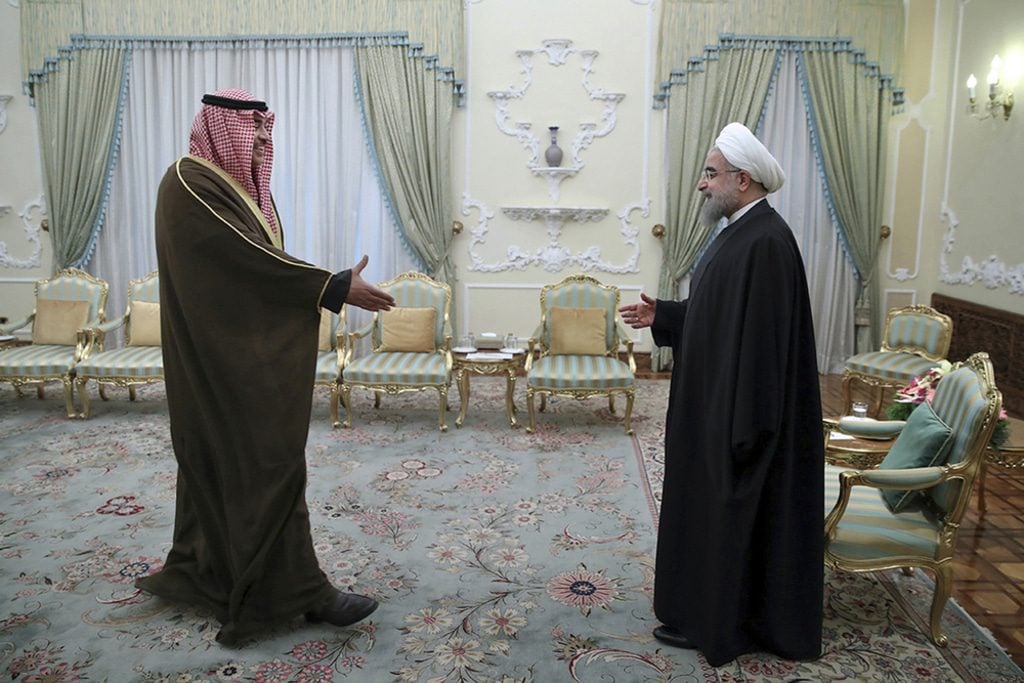
The relationship between the Gulf Cooperation Council (GCC) and the Islamic Republic of Iran has deteriorated gradually since the Islamic Revolution in 1979. A new trigger followed the execution in Saudi Arabia of the Shia opposition figure Sheikh Nimr al-Nimr in January 2016, reportedly for sedition, among other crimes. In protest, Iranian mobs vandalized the Saudi embassy in Tehran and its consulate in Mashhad, allegedly on the orders of hard-line elements in the Iranian regime. Riyadh and Bahrain subsequently cut all diplomatic ties with Tehran. Other GCC countries either downgraded their relations with Iran or explicitly condemned the events.
The six member states of the GCC (Saudi Arabia, Kuwait, Bahrain, Qatar, United Arab Emirates and Oman) claim that Iran has been meddling in their internal affairs since 1979, but this has largely fallen on deaf ears internationally. As long as there is a reasonably cheap and uninterrupted flow of oil and gas from the Persian Gulf, the West may not be particularly interested in trying to address interstate conflicts in the region.
The revolutionary rhetoric of the Shiite Islamic Republic is a constant irritant to its Sunni Arab neighbours. Ruhollah Khomeini, the founder of the Islamic regime in Iran, referred to the al-Saud family with great distaste and spoke of them in the most derogatory terms in his will. In turn, the late Saudi King Abdullah called on the United States to “cut off the head of the snake”, that is, to destroy the Iranian nuclear installations, according to leaked American diplomatic cables.
Gulf states also accuse Iran of supporting radical elements within the Shiite opposition to the government in Bahrain and of arming Houthi rebels in Yemen. The Gulf states oppose Iranian military assistance to the al-Assad regime in Syria as well as the connection between Tehran and Hezbollah in Lebanon and Shiite militias in Iraq. In March 2015, a Saudi-led Sunni coalition launched a military campaign against Yemen’s Houthis, which two years later is still ongoing.
At the root of the conflict between Iran and its Arab neighbours lies the Shia-Sunni divide, as the patrons of the two Muslim sects, Tehran and Riyadh respectively, are both prepared to promote and support their sectarian beliefs. Conflicts in Yemen, Syria and Bahrain can be viewed in this light. Yet it is also the result of an ordinary struggle between two regional powers.
Politics being what it is, the players are required to practise realpolitik. Both camps seek alliances and both justify their otherwise political manoeuvring in terms of religious doctrines. Obviously, there cannot be an outright winner in this war nor can there be any gradual loser. The balancing act that safeguards the interests of the major powers cannot allow the emergence of a regional hegemon. But it can coexist with a war of attrition that depletes the resources of the warring factions, enriches the coffers of arms manufacturers and ensures the dependence of the belligerent parties on their supplier of weaponry and the buyers of their oil.
Kuwaiti Deputy Prime Minister and Foreign Minister Sheikh Sabah Khaled al-Sabah visited Iran in January 2017 with a written message from the GCC. “It’s necessary that the differing views and misunderstandings between the countries of the region should come to an end in a calm atmosphere and through frank dialogue,” he was quoted as saying. Iran’s initial response to this conciliatory gesture was said to be encouraging. Iranian President Hassan Rouhani made visits to Kuwait and Oman. Yet there have been no further indications of a thaw in any of the arenas of conflict between the sides.
One important factor may now change the game. The election of President Donald Trump and his radical departure from his predecessor’s accommodating approach to Tehran have ruffled feathers in the Islamic Republic. The littoral states of the Persian Gulf now feel there is a window of opportunity to garner the support of Washington in countering Iran’s activities. Although the White House does not yet appear to have formulated any firm policy on Iran, all signs point to a much tougher line by the US that could include military engagement.
Clearly the region is in a state of flux. The degree of uncertainty and instability suggest changes in power allocation and shifts in alliances. For now, Iran can count on close relations with Moscow, as exhibited by President Rouhani’s visit to the Kremlin in late March 2017. As long as Moscow wants to keep al-Assad’s regime in power in Damascus, it needs Iran’s military support. However, a more aggressive US stance towards Iran could render Iran vulnerable in many of its regional battlegrounds.


